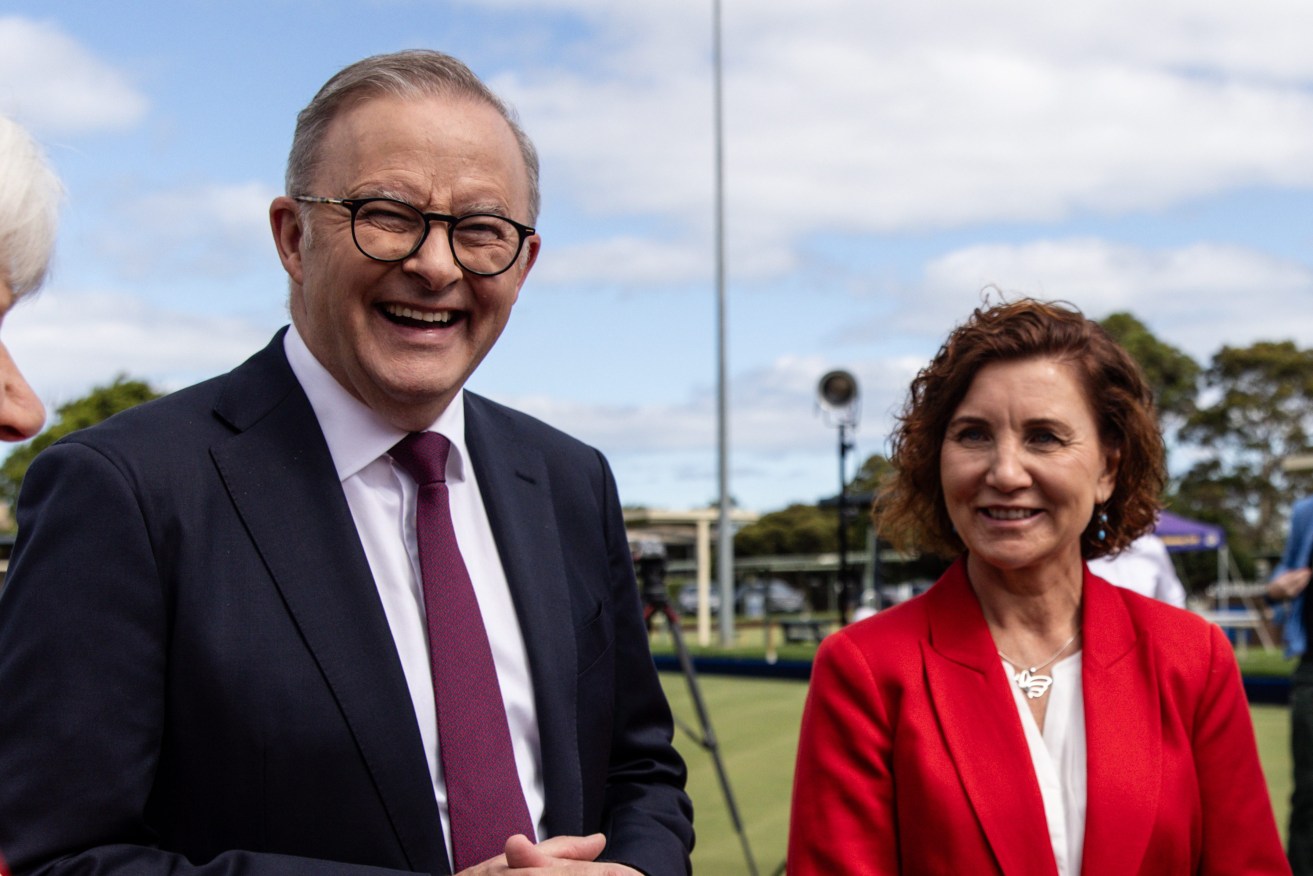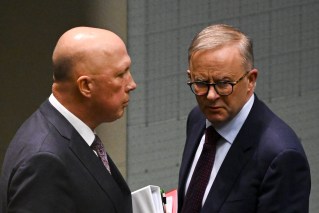Can by-elections help Labor out of the quagmire – or leave it slipping further in?
Parliament is sitting, Anthony Albanese went to a Taylor Swift concert and a by-election looms this weekend. Dennis Atkins takes the electoral chicken out of the pot and picks over the entrails.


Australian Prime Minister Anthony Albanese (centre) and Candidate for Dunkley Jodie Belyea (right) pose for a photograph at the Frankston Bowling Club in Melbourne. (AAP Image/Diego Fedele)
By-elections are not the main event but they have played an often out-sized role in our politics, especially at a national level.
Perhaps the most famous and – for Labor the most foreboding – was the 1975 Bass by-election held in the northern part of Tasmania. Just short of six months before the crushing defeat to Malcolm Fraser and the Liberals, Gough Whitlam’s government suffered a swingeing 17.5 per cent swing. It was an omen of things to come and come they did.
A wipe-out for the local government in the ACT in 1995 – wiping the popular Labor Government over the fence and out – also foretold the Howard landslide just over a year later (even though then Prime Minister Paul Keating dismissed it with his typical insouciance, saying “So what?”).
John Howard had a year with two very different by-elections in 2001 when the once blue-blood western Brisbane seat of Ryan fell to Labor for the first (and last) time since federation; and half a year later the Liberals were “back in the game” after holding the suburban Melbourne seat of Aston in a by-election.
March has a couple of by-elections well worth watching, a national one in the Victorian seat of Dunkley this coming Saturday and, of greater local interest, the Ipswich West and Inala contests for state parliament being held concurrently with the Queensland local government polls (these latter contests will be talked about soon).
Dunkley might not rank a second or third glance but for the meta environment in which we find ourselves politcally.
Anthony Albanese drew every lucky card in the deck in the last federal election – from facing off against a wounded and under performing Scott Morrison to catching Covid just in time to hide his own-goal disaster of not knowing the basics of the economy.
The first phase of Albanese’s government was acceptable but he scored admiration for the easiest of jobs: he wasn’t Morrison and he could run down a list of promises and deliver many.
The next phase saw 2023 turn into a quagmire for Labor. A fixation on Constitutional recognition of a voice to parliament for indigenous peoples created a political stasis no-one could shake off, least of all Albanese.
This side track gave a platform for everyone who wanted an argument and shut out discussion of significant reforms such as a $150 million expansion of Medicare access and child care changes worth about $1700 a year to most families.
The loss of the indigenous voice referendum sapped confidence and spirit and Albanese appeared unable to snap himself out of the slump. When the popular local MP for Dunkley, community champion and anti-gambling campaigner Peta Murphy died after a recurrent cancer battle at the beginning of December, Labor politicians and operatives were sad and despondent.
They rightly saw her death, just shy of 50, as a cruel personal twist of fate. People also thought a seat that otherwise should be safely in the Labor column – with a 6.3 percent buffer – might be not just vulnerable but maybe impossibly hard to hold.
A brighter outlook for Labor, especially after the rethink on the give-away to the rich tax cuts, and occasional phases of positive engagement by the prime minister, have cheered many in government ranks.
But not completely, which is why the outcome for this Saturday is not worth betting on – an each-way flutter on Vow and Declare in the Australian Cup is a better way to go.
On paper, Labor should win. Apart from the comfortable margin, the Liberal candidate is an unpopular mayor of the out-of-favour Frankston Council which dominates the seat.
The Victorian Liberals have the most toxic brand of any party in the country. As former Coalition strategist and current pollster for Redridge Tony Barry said last week, the Libs in Victoria had the capacity “to end Taylor Swift’s career within a month”.
There are serious issues which spark concern, especially among the growing Millennial and Gen Z voters (who account for two in five electors) especially housing and escaping the rent treadmill.
These people occupy what sociologists call the precariat, those who exist without predictability or consequent security. For this cohort survival is critical followed by a deep concern about the wider security of the planet, especially in respect of climate.
This is fertile ground for Labor but after the sluggish indolence of last year, there’s an understandable fear many of these voters might turn off, go to the Greens or stay home.
Other reasons to worry are historic as much as anything. Labor suffers more at by-elections than the Coalition – since the Hawke Government 40 years ago there have been 52 by-elections and, according to data from ABC elections analyst Antony Green, the outcomes generally favour the Liberal and National parties.
Of those 52 contests, just 28 were regular two party affairs, the average swings were greater against Labor in all ways the results were dissected.
Swings against Labor governments were double those against Coalition governments (4.7 against 2. percent), the average swing in a government-held seat was much larger than that in an opposition-held seat (5.4 to 1.2 percent) and those by-elections in Labor seats when Labor was in power saw swings against the party of 8.2 percent on average against just 2.3 percent for the Coalition.
To paraphrase Paul Keating, these are not a beautiful seat of numbers.
On top of this history, there’s a Right wing agit prop operation, Advance Australia, run by dark money businessmen who funded the campaign against the voice referendum in the mix.
They play hard and run nasty ad hominem character assault on Albanese and Labor generally.
Whether they have any influence will be an interesting side show of the Dunkley weekend. Advance Australia hit the mark on the voice vote because they were preaching to an electorate which already held the views they were being sold. It was political confirmation bias.
For this by-election they are sounding the alarm on asylum seekers and changes to fuel efficiency standards. If these messages have a real world impact, Albanese and his colleagues should look for a new song sheet. A loss in Dunkley cannot be easily shaken off.












